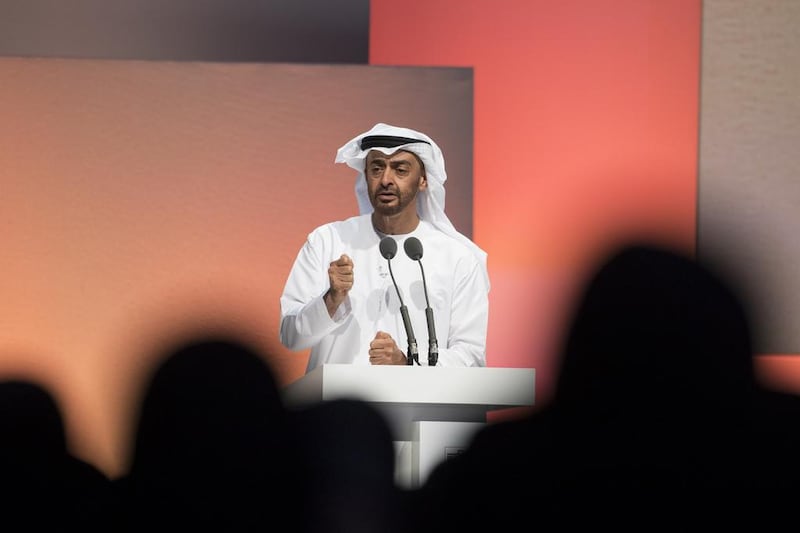Sheikh Mohammed bin Zayed's speech was truly inspiring and I totally agree that the UAE needs to become a self-sustainable knowledge economy in order to prosper in the long term (The future of the UAE will not come through oil, March 12).
Sheikh Rashid bin Saeed Al Maktoum knew this too. His famous line – “My grandfather rode a camel, my father rode a camel, I drive a Mercedes, my son drives a Land Rover, his son will drive a Land Rover, but his son will ride a camel” – reflected his concern that oil would run out within a few generations.
So he started building the infrastructure of the metropolis Dubai is today. Now local talent is needed to take it into the future. It’s an exciting time. My best wishes to this amazing country.
Fiona Ellevsen, Dubai
Thank you for the excellent editorial. I say what Sheikh Mohammed said to my middle-school students all the time, but they do not seem to believe me.
I will show this editorial to my students. This campaign should start at the school level so as to better prepare them. Parents also need to constantly relay this message to their children.
Rjj Saraiva, Abu Dhabi
Get tough with litterbugs
I don't understand why people can't take their rubbish and either place it in the nearest bin or take it home and bin it there (Abu Dhabi has a litter problem and it's time we sorted it out, March 12). We live in a beautiful place and the amount of rubbish lying around is tragic.
Gill Dow, Abu Dhabi
Ban smoking in all the parks. The rare green areas available for children to play on are littered with cigarette ends and small pieces of rubbish.
Erika McDonnell, Abu Dhabi
Stricter and consistent fining of litterbugs and possibly community service that entails taking over a street cleaner’s job for a few hours a day in the middle of summer would be a great start.
Casey N Corley, Qatar
Seeing people throw things, especially out of cars, makes me angry. But for some people, it’s just a habit.
Rachel Croft, Abu Dhabi
This is not a culture of “I’ll clean up after myself”. It’s a let-someone-else-do-it society. In many countries, the streets fill with litter by day and at night are swept clean. People are simply expected to litter.
These habits predate history. We are hard-wired to behave this way. If modernity is to succeed, we have to fix the society as a whole.
In times of pre-history, our litter also degraded biologically. If we don’t get a handle on the plastic waste and its indefinite lifespan, then no amount of dredging will ever keep the creek clear or alive.
Are the oceans alive in Dubai? Or do you stare into a dead and littered sea?
Christopher Einshtein, Dubai
Many problems for the disabled
Regarding your story Disabled in Dubai laying on the horn at those who illegally parkers in designated spots (March 11), I have a blue disabled badge, which I am allowed to use anywhere in the United Kingdom and in other European countries. I could also use it in Florida. But when I parked in a disabled bay in Dubai, I was told that it was not valid and that I could be fined.
A policeman advised that I went to the RTA and swap it for a Dubai one. Since my licence is from Ras Al Khaimah, I went there. I asked whether I could use the RAK badge in Dubai? The answer was no.
Surely a global city like Dubai should accept all valid blue disabled badges issued from any country. After all, my disability will remain the same wherever I go.
Name withheld by requate
It is sad that bees have started using plastic instead of leaves (Dubai desert bee discovered using green plastic instead of leaves for nest, March 13). It’s time we became aware of the scale of the problem and banned plastic bags immediately.
The time that it takes for the average plastic bag to break down can be hundreds of years. These bags are clearly threatening the natural progression of wildlife. Because the breakdown rate is so slow the chances that the bag will harmlessly go away are extremely slim.
Throughout the world, plastic bags are responsible for suffocation deaths of animals as well as inhibiting soil nutrients.
The land litter that is made up of plastic bags has the potential to kill over and over again. It has been estimated that one bag has the potential to unintentionally kill one animal every three months due to digestion or inhalation.
Without the balance of the ecosystem food sources dry up and starvation occurs. With an increase in plastic bag use not just here but across the world, the eventual effects could be devastating even to the human population.
Varsha John, Abu Dhabi





